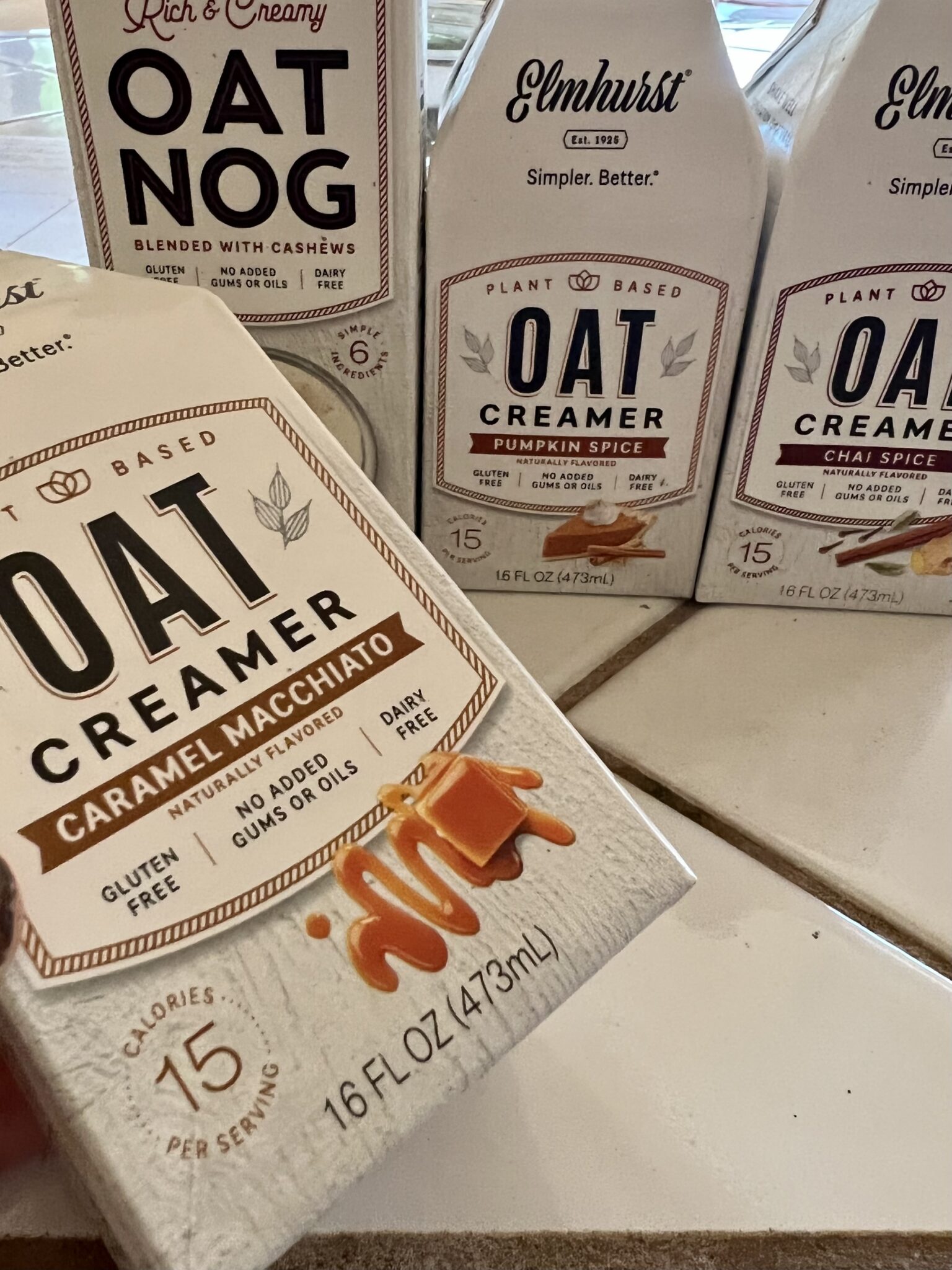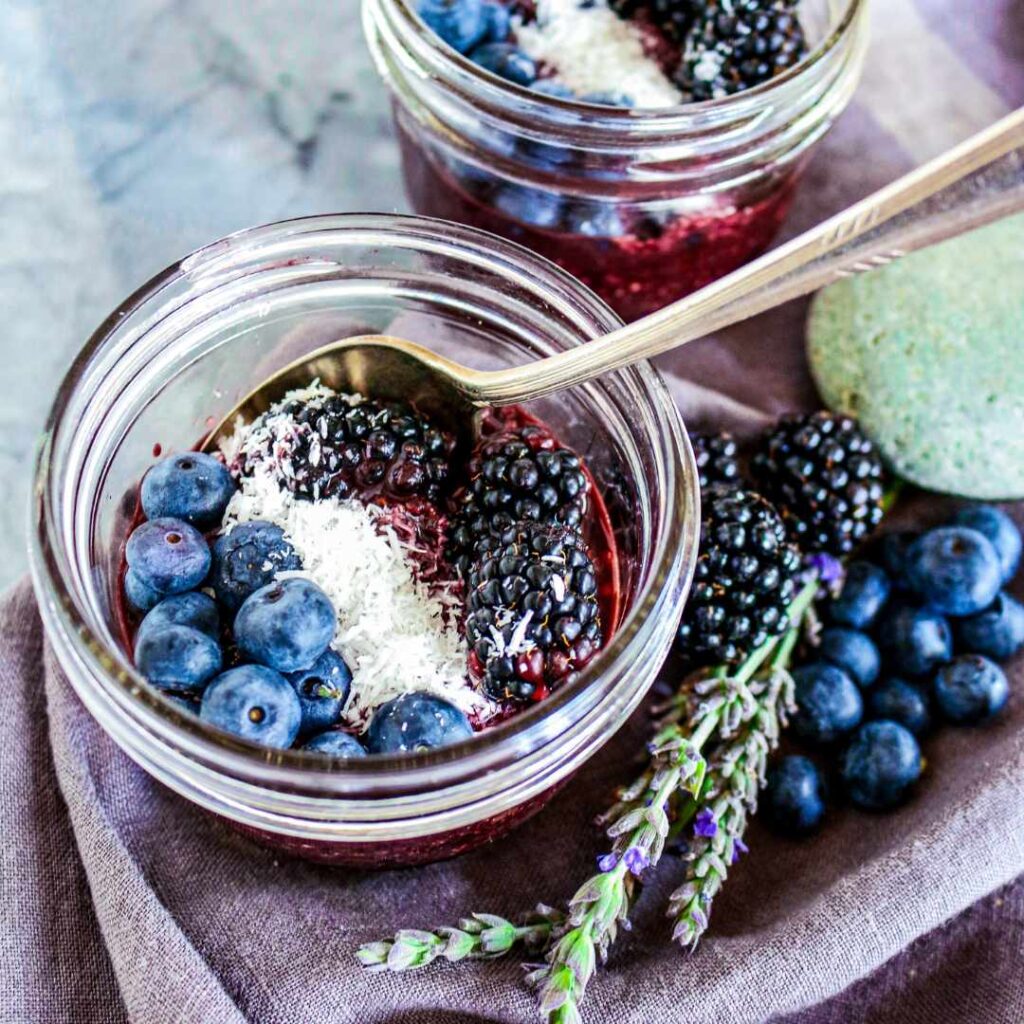Oat milk is having its moment, but is oat milk good for you? Learn about the pros and cons of oat milk nutrition and sustainability, as well as how the best oat milk products compare in this expert oat milk guide.
Today you’ll find an endless array of plant-based milk options in most supermarkets, including milk from soy, almond, cashew, hemp, flax, and more. And oat milk is one of the most popular trends out of all the plant-based milk options, becoming our go-to plant based milk alternative. You’ll see it in creamers, ice cream, coffee drinks, yogurts, and much more. You can also use oat milk with great versatility in the kitchen, as its mild creamy flavor makes it a favorite addition to cereals, desserts, sauces, smoothies, beverages, and baking. But what are the benefits of oat milk? How does it measure up when it comes to comparing oat milk vs almond milk or other varieties of plant milks? For sure, there are pros and cons to favoring oat milk in your diet. That’s why I’m answering your top questions on whether oat milk is good for you in this expert oat milk guide.
However, children and those following a 100% vegan diet should be more aware of the ingredients and nutritional value of the plant milks in order to obtain sufficient amounts of protein, calcium, and vitamin D into their diet. There are numerous oat milk brands that are naturally sweet in taste without the added sugar, but it’s still important to read the nutrition label to avoid oat milk that contains added sugar. Overall, there may be some better options for milk alternatives that are also 100% plant-based and packed with nutrients. Today, I’m here to answer your top questions on whether or not oatmilk is the best plant-based milk option for you!

Question: What are some of the benefits of oat milk?
Sharon’s Answer:
Oat milk has a better environmental footprint than many types of milks, including dairy milk. It has a significantly lower carbon footprint, and uses significantly less land and water too. Since it is made from a grain, it has a better environmental footprint because grains are very sustainable foods, in general. In addition, oats are not very allergenic—most people can tolerate them quite well. So, if you suffer from nut or soy allergies, oat milk is a good option. And oats have specific health benefits too–for example, consuming oats is linked with heart health. In addition, oat milk has a really mild, creamy neutral flavor, making it suitable for many applications in the kitchen. The downside of oat milk is that it is not very high in protein—only about 2 grams per portion. If you need protein in your plant milk choices, then you might want to search out a higher protein choice, such as soy milk or a fortified plant milk.

Question: Who shouldn’t drink oat milk?
Sharon’s Answer:
I recommend protein-rich milks for young children, and people who are eating a 100% plant-based diet and need to get reliable sources of protein in their plant milks—this is especially true for people who may be falling short on protein. If plant milk is a big contributor to your diet, and you are eating 100% plant-based, I think it’s important to try to get protein-rich plant milk in your diet, which provides at least 7 grams of protein per 1-cup serving. Other people that might benefit from a more high-pro plant milk would be elderly, who need more protein and may have difficulty meeting their nutrient needs overall. The good thing is that many oat milks are fortified with vitamin D and calcium, meaning they can provide good sources of those important nutrients. I recommend looking for these fortified plant milk products.

Question: What aspects of these oat milks are not healthy? What about oat milk lattes?
Sharon’s Answer:
You can look up the nutrition information of oat milk lattes on company websites. Some oat milks do not have added sugars or are low in added sugars. Those are the ones you want to choose. However, it’s important to note that many plant milks, including oat milks, do contain added sugars, particularly in the flavored varieties. It’s a good idea to read the ingredient list looking for added sugars, and the nutrition facts panel to look for added sugars. Try to keep this to a minimum or none at all. And keep in mind that some coffee shops add syrups and sweeteners to lattes, so check out nutrition facts prior to ordering your coffee.

Question: How does oat milk compare to dairy milk?
Sharon’s Answer: Oat milk does not have the same nutritional profile as dairy milk—it has lower protein levels, but it also has fiber (2 grams per serving) and other beneficial nutrients naturally found in oats. Plus, unlike full fat dairy, oat milk has no cholesterol or saturated fat—the natural fats in oats are unsaturated. In addition, many oat milks are fortified so they have similar levels of vitamin D and calcium as dairy milk. Many plant milks are a bit lower in protein—so oat milk compares closely to plant milks in that regard—soy milk has the highest protein levels—very nutritionally similar to dairy milk. In addition, you can find protein-fortified oat milks that have higher levels purposefully.

Question: What is it that makes oat milk so delicious?
Sharon’s Answer: The blending during the manufacturing process can make it creamy, unlike some plant milks that can feel chalky. Grains like oats have starches, which can produce a natural sweetness and thickening quality. In addition, oats are very neutral in flavor, thus they provide a mild flavored milk that tastes more like dairy milk, unlike soy milk which can have a beany flavor. Many oat milks that are not sweetened with added sugars are mildly and naturally sweet on their own. However you can certainly find products with added sugars, so keep your eyes open on ingredients lists. You can make oat milk yourself at home; it’s not that difficult. All you do is blend oats with water and strain it.

Oat Milk Product Nutrition Comparison
| PLANT BASED MILK(1 Cup) | calories | fat | Sat fat | Carbs
(g) |
Sodium
(mg) |
Sugar
(g) |
Protein
(g) |
Calcium
(mg) |
Vitamin
D(iu) |
| 365 Original Oat Milk | 120 | 5 | 0 | 16 | 140 | 7 | 3 | 350 | 140 |
| Califia Farms zero sugar Oat Drink | 100 | 4.5 | 0 | 12 | 100 | 0 | 1 | 260 | 176 |
| Califia Farms Oat Barista Blend | 130 | 7 | 0.5 | 14 | 110 | 7 | 2 | 250 | 81 |
| Chobani Oat Milk Extra Creamy | 140 | 8 | 1 | 13 | 105 | 7 | 2 | 100 | 60 |
| Elmhurst Unsweetened Milked Oats | 80 | 1.5 | 0 | 14 | 120 | 1 | 3 | 22 | 0 |
| Forager Project Organic Oat Milk | 160 | 8 | 1 | 23 | 70 | 5 | 2 | 31 | 0 |
| Happy Planet Original Oat Milk | 100 | 2 | 0 | 17 | 70 | 6 | 3 | 300 | 0 |
| Minor Figures Oat Milk Barista | 116 | 5 | 0.5 | 23 | 110 | 11 | 0.5 | 240 | 0 |
| Oat Some Oat Milk Original | 130 | 4 | 0 | 21 | 60 | 13 | 2 | 289 | 80 |
| Oatly Low Fat Oat Milk | 91 | 1 | 0 | 16 | 100 | 7 | 3 | 350 | 144 |
| Oatly Original Oat Milk | 120 | 5 | 0.5 | 16 | 100 | 7 | 3 | 350 | 144 |
| Pacific Foods Original Organic Oat Milk | 130 | 2 | 0.5 | 25 | 105 | 17 | 4 | 120 | 80 |
| Planet Unsweetened oat milk | 45 | 0.5 | 0 | 8 | 100 | 0 | 1 | 350 | 160 |
| Planet Oat Original | 90 | 1.5 | 0 | 19 | 120 | 4 | 2 | 350 | 160 |
| Quaker
Oat Beverage original |
50 | 2.5 | 0 | 10 | 65 | 5 | 1 | 350 | 100 |
| Malk Original organic oat milk | 90 | 1.5 | 0 | 17 | 190 | 6 | 3 | 10 | 0 |
| Silk Canada Original oatmilk | 120 | 5 | 0 | 18 | 100 | 7 | 1 | 470 | 160 |
| Silk Oat Yeah Oatmilk unsweetened | 70 | 4.5 | 0.4 | 8 | 90 | 0 | 1 | 300 | 80 |
| Simply Oat Original | 80 | 1 | 0 | 15 | 100 | 4 | 2 | 0 | 0 |
| Trader Joe’s Oat Milk | 110 | 2 | 0 | 22 | 25 | 4 | 2 | 20 | 0 |
Try these recipes that contain plant-based milk:
Check out the other nutrition questions I’m answering at The Plant-Powered Dietitian:
Learn more about plant-based alternatives comparisons here:
Written by Sharon Palmer MSFS, RDN with Savannah Malki, dietetic intern and Jael Nyambura, dietetic intern

